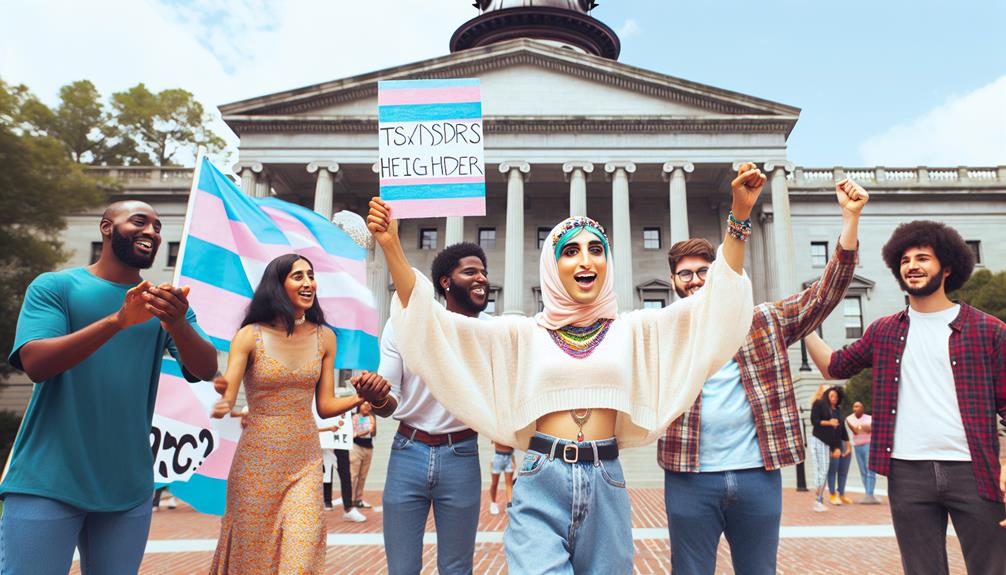
California Transgender State of Affairs
The landscape of transgender rights and healthcare in California is currently undergoing significant shifts. Recent legislative developments have sparked both support and opposition, creating a complex and evolving environment for transgender individuals in the state.
As these changes continue to unfold, it is essential to understand the multifaceted nature of the issues at hand and the impact they have on the lives of transgender individuals and their families.
Key Takeaways
- California has made legislative advances for transgender rights through bills such as Senate Bill 107 and Assembly Bill 1666.
- Access to gender-affirming healthcare remains a challenge due to legislative opposition, societal stigma, and concerns raised by opponents.
- Transgender representation in California politics is strong, with organizations like TransFamily Support Services promoting legislation and the Attorney General defending transgender rights.
- Discrimination and hate crimes against transgender individuals are significant issues, leading to increased rates of mental health issues and unreported or unresolved crimes.
Legislative Advances for Transgender Rights
In a significant step forward for transgender rights, California has made legislative advances through the approval and signing of Senate Bill 107, providing crucial support for transgender youth and their parents in the face of national debates and legal challenges.
This legislation, in conjunction with Assembly Bill 1666, solidifies California’s position as a refuge for minors seeking gender-affirming medical care. By authorizing this bill, State Senator Scott Wiener has taken a stand to protect the rights of transgender minors, despite opposition from figures like State Senator Melissa Melendez and Jonathan Keller, president of the California Family Council.
The provisions of Senate Bill 107 aim to prohibit law enforcement participation in restricting transgender healthcare and declare California as a safe haven for transgender rights. This move is particularly significant amidst the national wave of legislation seeking to restrict access to gender-affirming medical care for transgender youth.
The bill’s significance lies in its protection of transgender youth and their parents, addressing concerns about long-term effects and lack of consent, and its potential impact on the ongoing lawsuit and ballot initiative, adding to the complexity of the legislative landscape in California.
Challenges in Accessing Gender-Affirming Healthcare
Despite the legal and societal challenges, accessing gender-affirming healthcare in California remains a pivotal concern for transgender youth and their families. The state has made strides in legislative advances for transgender rights, yet barriers to accessing gender-affirming care persist. This has significant implications for the mental health and well-being of transgender individuals. The following table illustrates the challenges faced in accessing gender-affirming healthcare in California:
| Challenges in Accessing Gender-Affirming Healthcare | Impact |
|---|---|
| Legislative opposition and societal stigma | Limited access to essential care and support |
| Criticism and legal challenges facing Senate Bill 107 | Uncertainty and fear among transgender youth and their families |
| National wave of legislation restricting access to gender-affirming care | Reduced availability of necessary medical treatments |
| Concerns raised by opponents, including fears of irreversible treatments for children and lack of consent | Delayed or denied access to gender-affirming healthcare |
| Efforts to protect transgender rights, including shield laws and legislative advocacy | Ongoing uncertainty and legal battles |
These challenges not only affect the physical health of transgender individuals but also have a profound impact on their mental health. It is vital for parents, communities, and policymakers to work together to ensure equitable access to gender-affirming healthcare and uphold the civil rights of transgender individuals.
Transgender Representation in California Politics
Amidst the ongoing debate on transgender rights, California’s political landscape reflects a growing presence and advocacy for transgender representation. Organizations like TransFamily Support Services, led by Kathie Moehlig, have played a pivotal role in promoting legislation such as Senate Bill 107, which has been crucial in solidifying California’s commitment to providing gender-affirming care. Despite opposition from some state senators and religious organizations, California has emerged as a refuge for transgender individuals seeking access to essential healthcare. The state’s proactive stance is evident in bills like Assembly Bill 1666 and Senate Bill 107, which exemplify its dedication to protecting the rights of transgender people.
The significance of Senate Bill 107 can’t be overstated, as it not only safeguards the rights of transgender individuals but also positions California at the forefront of the national conversation on transgender issues. The ongoing lawsuit and ballot initiative surrounding the bill underscore the contentious nature of the debate. California’s Attorney General has been instrumental in defending the legislation, highlighting the state’s commitment to ensuring equitable access to gender-affirming care.
This representation in California politics is a testament to the state’s dedication to advocating for the rights and well-being of transgender individuals.
Discrimination and Hate Crimes Against Transgender Individuals
Frequently, transgender individuals face discrimination and hate crimes that significantly impact their well-being and safety in society. This discrimination takes a toll on the mental and emotional health of transgender people, leading to increased rates of anxiety, depression, and suicide. Additionally, hate crimes against transgender individuals often go unreported or aren’t effectively prosecuted, creating a climate of fear and vulnerability within the community. This can further isolate transgender youth, making them more susceptible to bullying, harassment, and violence.
The lack of understanding and acceptance of transgender individuals within law enforcement agencies can hinder the proper investigation and resolution of hate crimes against them.
Discriminatory legislation that would restrict the rights and access to essential healthcare for transgender youth, such as trans girls, is a growing concern, impacting their overall well-being and development.
Advocates like Chloe Cole, the executive director of a transgender advocacy organization, and lawmakers like Scott Wiener are working tirelessly to address these issues by pushing for comprehensive anti-discrimination laws and policies that protect transgender individuals from harm and promote their inclusion in all aspects of society.
Community Support and Advocacy Efforts
Community organizations and advocacy groups in California are actively working to provide support, resources, and political advocacy for the transgender community. TransFamily Support Services, founded by Kathie Moehlig, offers support groups, medical system navigation assistance, and political advocacy. This organization also co-sponsored Senate Bill 107, signed by Gov. Gavin Newsom, which has become a significant milestone in providing support and protection for transgender individuals.
The bill was supported by State Senator Scott Wiener and opposed by State Senator Melissa Melendez, Jonathan Keller, and Tony Hoang. It aims to address concerns about access to gender-affirming medical care for transgender youth. This includes measures to provide privacy policies for transgender patients, access to puberty blockers, and other gender-affirming treatments.
It’s crucial to recognize the efforts of these organizations and the state Sen. in establishing California as a safe and welcoming environment for trans people. This support is particularly vital amid the national wave of legislation restricting transgender healthcare. By actively advocating for the rights and well-being of transgender individuals, California is setting an example of inclusion and support for LGBTQ+ people.
Frequently Asked Questions
What Is the Law for Transgender Students in California 2023?
In 2023, California law protects transgender students by ensuring their access to gender-affirming care. This law prohibits law enforcement involvement and declares it a low priority. It aims to provide a safe haven for transgender youth seeking necessary medical support.
Despite facing opposition, the law intervenes to safeguard vulnerable populations. This measure is crucial in ensuring that transgender students have access to the care they need to live authentically and thrive.
What Is the Law in California About Gender?
In California, the law about gender emphasizes protecting the rights of individuals to access gender-affirming care. This legislation aims to provide a safe space for minors seeking such care, prioritizing their well-being.
It reflects a broader commitment to supporting transgender rights and ensuring access to healthcare that aligns with one’s gender identity. This inclusive approach is part of a national movement to address the needs of transgender individuals and promote their well-being.
Is California the First State to Recognize Transgender History Month?
Yes, California is the first state to recognize Transgender History Month, designating August as a month to honor trans history starting in 2024.
This designation was established through House Resolution 57, acknowledging California’s long-ranging significance in trans history.
It’s a symbolic declaration holding deep meaning and combatting misinformation, highlighting the importance of recognizing and celebrating LGBTQ+ history.
The state’s recognition is a significant step towards promoting inclusivity and understanding.
What Are the New Bathroom Laws in California 2023?
In 2023, California enacted new laws to ensure gender-inclusive restroom facilities. These laws require all single-occupancy restrooms in businesses, government buildings, and public places to be labeled as gender-neutral.
This change aims to create a more inclusive and welcoming environment for individuals of all gender identities. By implementing these laws, California seeks to promote equality and respect for transgender and non-binary individuals in public spaces.
Final Thoughts
California’s transgender state of affairs is a battleground of progress and resistance.
With legislative victories for transgender rights, challenges in accessing healthcare, and ongoing discrimination, the state remains at the forefront of the national conversation on transgender issues.
Despite opposition, organizations like TransFamily Support Services continue to advocate and provide vital support for the community. The fight for equality and acceptance for transgender individuals in California rages on, with no sign of slowing down.
















